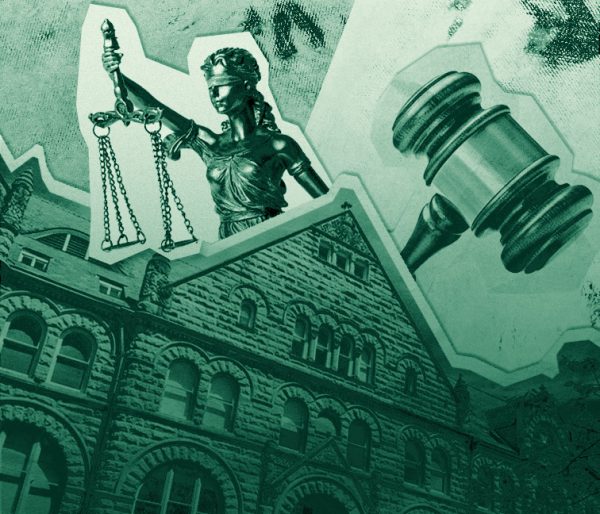
Tulane University’s class of 2028 is the first class to be admitted after the U.S. Supreme Court’s reversal of affirmative action.
The class of 2028 is the most socioeconomically diverse class in Tulane history, but it is the first class in seven years to not be the most racially diverse class in university history.
“Overall, we were pleased to see that we enrolled one of the most widely ethnically, internationally and socioeconomically representative first-year classes in Tulane history,” Dean of Admissions Shawn Abbott said in an email to The Hullabaloo. “More importantly, the academic quality — as measured by GPA and testing — appears to be the strongest we’ve ever recorded at Tulane.”
In June 2023, the Supreme Court ruled to end affirmative action, meaning that colleges can no longer consider race as a factor in their admissions.
“Following the decision announced by the U.S. Supreme Court earlier today, we write to you to reaffirm the university’s commitment to diversity as an essential element of our commitment to excellence,” Fitts said in a statement following the Supreme Court’s elimination of affirmative action. “Tulane must be an equitable, diverse and inclusive community that welcomes and supports a wide array of students, faculty and staff.”
In the class of 2028, 28% of students identify as a person of color, 3% less than the class of 2027.
Tulane’s socioeconomic diversity increased. 14% of students are first-generation college students, up 4% from last year. 13% of students are Federal Pell Grant recipients, up 4% from last year.
“The growth in enrolling students from low-income backgrounds is historic,” Abbott said. “At the same time, our decrease in racial diversity was very modest.”
Academic statistics increased slightly from the class of 2027. The average GPA remained at 3.7, the average ACT score rose from 32 to 33 and the average SAT score rose from 1448 to 1461.
LGBTQ+ students fell 1%, to 12%.
Laura Adderley, a professor specializing in African-American history and the former administrative director of the Africana Studies program, is skeptical of the admissions data’s relevance to affirmative action.
“It’s a year,” she said. “Give me a five-year window of statistics.”
Adderley said factors other than the reversal of affirmative action could be at fault for the drop in racial diversity. She said students may be less likely to apply to Tulane because affirmative action makes them feel it is an unrealistic choice, or they may be less likely to submit their racial identity on college applications. “I’d be extremely cautious about suggesting that we can see [an effect] in this class.”
A study by the Common App entitled “Application trends following the end of race-conscious admissions” found that there were no significant changes to the diversity of the applicant pool.
“In general, students seemed not to have responded in clear or pronounced ways to the Supreme Court decision with respect to their racial/ethnic self-identification on our platform or in their application behaviors,” the study said.
However, the study said that readers should not indulge in “over-interpretation” of the study’s discovered trends due to the trends’ “small magnitude in the context of the inherent noisiness of our season-by-season data, and of the overall…non-causal…nature of these analyses.”
“Within our office, we’re trying to find ways to create a sense of belonging for so many different populations of people that are represented here at Tulane,” Director of Multicultural Affairs Cara Guilbeau, said. She believes that diversity is more than just a number at Tulane; it is an experience that her office helps foster.
Tulane has 58 cultural organizations and numerous multicultural events, such as the weekly Global Café and Equity Thursday meetings.
Guilbeau also teaches the class “Black Culture, Power and Leadership.” “We’re trying to do our best to teach our students through this course…the context of what it is to feel empowered and be a Black person that is educated [and] how you can still show up as your true, authentic self,” she said.
“Tulane’s admission criteria and processes are tailored accordingly to comply with the law,” Valencia Jones, Tulane admissions director of diversity initiatives, told The Hullabaloo in August 2023, after the initial Supreme Court decision. “We practice a holistic, individualistic, and contextual review to evaluate multiple, intersecting factors-academic, non-academic.”
The Supreme Court decision ruled that admissions offices are allowed to consider essays about a student overcoming racial discrimination if it is “tied to that student’s courage and determination” and not simply a disclosure of racial identity.
Guilbeau said the Office of Multicultural Affairs provides guidance to the admissions team “to let students of color know that we have X, Y and Z and that they’re going to be supported.”
“It remains to be seen whether applicant and application behaviors change more measurably going into next season, as students and their families gain greater clarity about the repercussions of these court decisions,” the study said.
“Our goals remain largely unchanged. We are committed to enrolling students with the strongest academic credentials and the strongest impact outside the classroom,” Abbott said. “Additionally, we remain committed to enrolling the most diverse student body we can — with an enhanced emphasis on socio-economic diversity to attract more first-generation college students and more students from low to limited income backgrounds.”
The Office of Multicultural Affairs revived the Multicultural Council, a subset of the Undergraduate Student Government, this semester. The MCC allows students “have conversations about the needs and what we can do to create these spaces for them, to advocate for what they want,” Guilbeau said. “Our work is based off of what students are needing and wanting.”
“Our desire to have a racial and ethnically representative student body hasn’t changed,” Abbott said. “We simply can no longer consider race as a criteria in our evaluation and selection process.”



